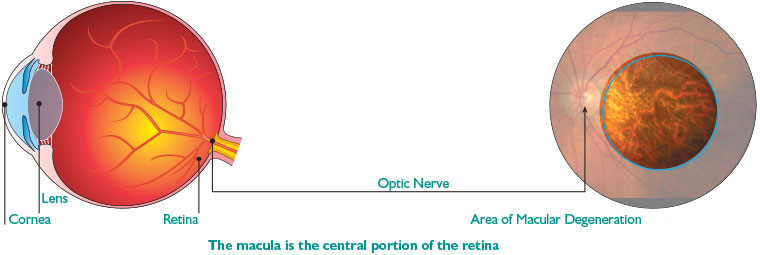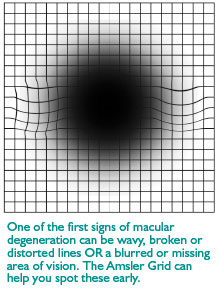What is macular degeneration?
Macular degeneration is an eye disease usually associated with aging that gradually diminishes central vision. Detailed vision is processed by the macula, which is the central part of the retina.When the macula becomes damaged many daily activities such as driving and reading become increasingly difficult.
 How many people suffer from age-related macular degeneration (ARMD)?
How many people suffer from age-related macular degeneration (ARMD)?
For people over age 60, age-related macular degeneration is a leading cause of legal blindness. Approximately 15 million Americans have ARMD, and, of those, 1.7 million experience serious visual impairment. The government estimates that by the year 2020, with the aging of the Baby Boomers, 3 million Americans could be functionally blinded by this disease.
Can younger people get macular degeneration?
Yes, early onset macular degeneration (birth to age 7) is a genetic disease, as is middle-onset macular degeneration (age 5 to 20). People in their thirties or forties can develop a form of the disease that is also inherited. Finally, myopic macular degeneration can occur in people who are severely nearsighted due to extreme elongation of the eyeball. The stretching of the retina can result in tears in the macula and bleeding beneath the retina.
What are wet and dry macular degeneration?
There are two forms of macular degeneration: dry macular degeneration and wet macular degeneration. The dry form, in which the cells of the macula slowly begin to break down, is diagnosed in 85 percent of macular degeneration cases. It may occur in one eye or both. The wet form, although it only accounts for 15 percent of the cases, results in 90 percent of the blindness. As the dry form worsens some people develop wet degeneration when abnormal blood vessels growing behind the macula. These fragile vessels will leak fluid (hence ‘wet’ macular degeneration) causing rapid damage to the macula.
How is macular degeneration diagnosed?
An eye care professional, as part of a comprehensive eye examination, will perform a retinal examination to help diagnose macular degeneration. If wet macular degeneration is suspected a special test called “fluorescein angiography” may also be performed.

What causes macular degeneration?
No one is certain as to what causes macular degeneration, but there appears to be certain risk factors. These risk factors include:
- Smoking
- Age (Americans have a two percent chance of having macular degeneration during their 50s, which
- increases to 25 percent for those age 65 and older)
- Gender (women appear to be at slightly higher risk)
- Family history (genetic component)
- High cholesterol
- Caucasians are much more likely to have macular degeneration than African Americans
- There are also suggestions that visible and ultraviolet light, low consumption of fruits and vegetables, and having light skin color and blue eyes may all be factors associated with increased risk.
Are there effective treatments for macular degeneration?
There is no current treatment for dry macular degeneration. For those who have wet macular degeneration, intraocular injection are the mainstay of treatment. Such as with Avastin®, Lucentis® and Eylea®. Vision that is already lost may be restored in some patients. If vision is already lost, low-vision aids exist that can help improve the quality of life.
What new research is being done to find a cure for macular degeneration?
Ongoing research continues with studies exploring environmental, genetic, and dietary factors that may contribute to macular degeneration. New treatment strategies are also being explored including retinal cell transplants, drugs that will prevent or slow the progress of the disease, radiation therapy, gene therapies, and agents that will prevent the growth of new blood vessels under the macula.
Can vitamin supplements help treat macular degeneration?
Recent clinical data has been released from the Age-Related Eye Disease Study (AREDS), a major research program to improve the understanding of the possible causes and protective or aggravating factors of macular degeneration, organized by the National Eye Institute (NEI), of the National Institutes of Health. NEI researchers found that people at high risk of developing advanced stages of macular degeneration lowered their risk by about 25 percent when treated with a high-dose combination of vitamin C, vitamin E, beta-carotene, zinc, and copper.
A physician should always be consulted before taking supplements. It is possible that the supplements may interfere with medication that you are taking or may cause undesired side effects.
Can diet prevent macular degeneration?
Some studies appear to indicate that eating a diet high in antioxidants may reduce the risk of developing age-related macular degeneration. More research is needed before definitive recommendations can be made concerning diet and its role in macular degeneration. Fruits and vegetables, especially those high in lutein and zeaxanthin, appear to provide the best protection.
Lutein can be found in spinach, collard greens, kale, broccoli, papaya, oranges, kiwi, mango, green beans, peaches, sweet potatoes, lima beans, squash, red grapes, and green bell peppers.
Zeaxanthin can be found in yellow corn, honeydew melon, squash, oranges, mango, kale, apricots, peaches, and orange bell peppers.
What is the best defense against blindness from macular degeneration?
The best defense is:
Comprehensive eye exams on a regular basis
- Maintaining a one-on-one relationship with a qualified eye specialist
- Appropriate follow-up schedule with your ophthalmologist
Other strategies might also include:
- Healthy diet high in antioxidants, zinc, lutein, and zeaxanthin
- Protecting your eyes from UV rays
- Taking AREDS® vitamin supplements
- Not smoking
- Using your Amsler Grid – Click to Print or Download Amsler Grid
If you have been diagnosed with macular degeneration it is important to discuss and understand all your options. See the Good Things We Do, With Your Own Eyes® – Schedule a consultation today!

